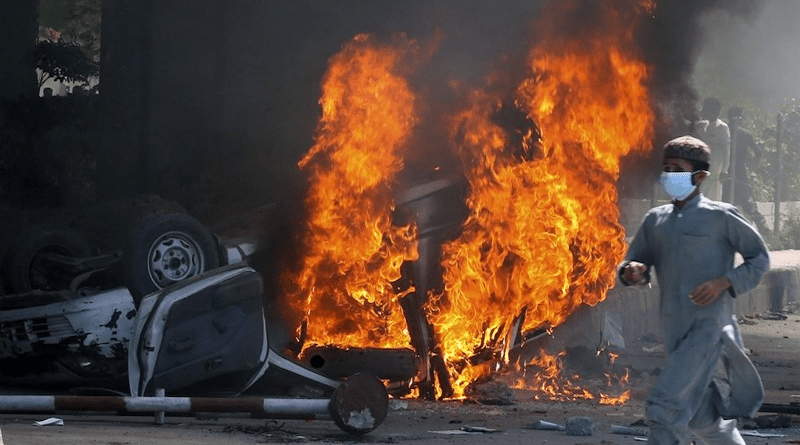Violence And Destruction: The PTI Supporter’s Response To Imran Khan’s Arrest – OpEd
By Dr. Sahibzada Muhammad Usman
The arrest of Pakistan’s ex-Prime Minister Imran Khan in May 2023 on charges of corruption has sparked outrage among his supporters, many of whom have engaged in violent and destructive behavior. Supporters of Khan’s party, the Pakistan Tehreek-e-Insaf (PTI), have been accused of attacking police stations, burning vehicles, and looting shops in protest of the arrest. This behavior has been widely condemned by political leaders, civil society organizations, and the general public.
The PTI came to power in 2018 with a promise to root out corruption and bring about change in Pakistan. Khan’s government has made several high-profile arrests of opposition leaders and businessmen on charges of corruption, and has taken steps to strengthen the country’s institutions and improve governance. However, the arrest of the ex-prime minister himself on similar charges has raised questions about the PTI’s commitment to the rule of law and its ability to govern effectively.
The behavior of PTI supporters in response to the arrest of Khan has been widely condemned by political leaders and civil society organizations. Many have called on the government to take strict action against those responsible for the violence, and to ensure that the rule of law is upheld. The PTI leadership has also been criticized for failing to control its supporters and for inciting violence through its rhetoric.
The behavior of PTI supporters has also been condemned by the general public. Many Pakistanis have expressed their disappointment and anger at the violence, and have called for an end to the political polarization and divisiveness that has characterized Pakistani politics in recent years. The violence has also had a negative impact on the country’s economy, with businesses and investors expressing concerns about the stability and security of the country.
The PTI’s response to the violence has been mixed. While the party leadership has condemned the violence and called for calm, some party members have defended the actions of the protesters and accused the government of political persecution. This has further fueled the polarization and divisiveness in Pakistani politics, and has raised questions about the PTI’s ability to govern effectively and uphold the rule of law.
The behavior of PTI supporters has also raised questions about the state of democracy in Pakistan. The country has a long history of political polarization and violence, with successive governments struggling to maintain stability and security. The PTI came to power promising to bring about change and improve governance, but the violence and destruction caused by its supporters suggest that the party is struggling to uphold these commitments.
The violence and destruction caused by PTI supporters has also had a negative impact on the country’s international standing. Pakistan has been struggling to attract foreign investment and improve its economic prospects, and the violence has raised concerns about the stability and security of the country. The international community has called on Pakistan to take strict action against those responsible for the violence, and to ensure that the rule of law is upheld.
The behavior of PTI supporters has also had an impact on the country’s media landscape. Many media outlets have been targeted by PTI supporters, who have accused them of bias and spreading fake news. This has raised concerns about press freedom and the ability of the media to hold those in power accountable.
In conclusion, the behavior of PTI supporters in response to the arrest of Imran Khan has raised serious concerns about the state of democracy, the independence of the judiciary, and the country’s stability and security. The violence and destruction that has been caused by the protests highlights the need for a more peaceful and constructive political discourse in Pakistan, and the PTI leadership must take strict action to ensure that the rule of law is upheld. The behavior of PTI supporters has also had an impact on the country’s international standing and media landscape, and the government must take steps to address these concerns and strengthen Pakistan’s democratic institutions.
Dr. Sahibzada Muhammad Usman is a Research Scholar and Academic; Ph.D. in Political Science at the University of Pisa, Italy. Dr. Usman has participated in various national and international conferences and published 30 research articles in international journals.

